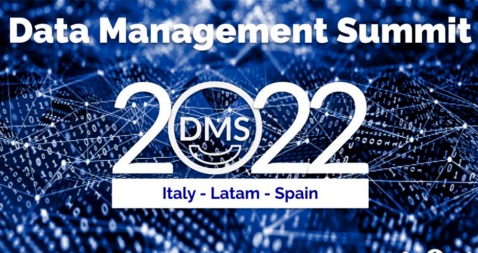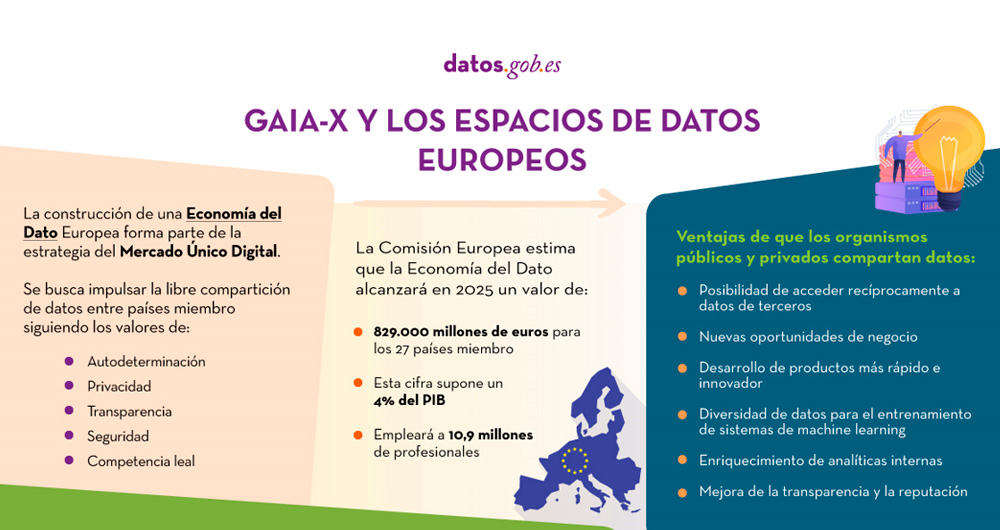DAMA Spain 2022 is enriched with experiences of data sharing between administrations
Fecha de la noticia: 14-11-2022

On 20 October, Madrid hosted a new edition of the Data Management Summit Spain, an international summit that this year also took place in Italy (7 July) and Latam (20 September). The event brought together CiOs, CTOs, CDOs, Business Intelligence Officers and Data Scientists in charge of implementing emerging technologies in order to solve new technological challenges aligned with new business opportunities.
This event was preceded by a prologue held the previous evening, in collaboration with DAMA Spain and the Data Office. This was a session aimed exclusively at representatives of different levels of public administration and focused on open data and information sharing between administrations. During the day, participants discussed the transformative role of data and how its intensive use and enhancement are essential to achieve the digital transformation of public administrations.
As was mentioned in the session, data plays an essential role in the development of disruptive technologies such as Artificial Intelligence, and is a differential factor when it comes to launching an industrial and technological revolution that allows for the consolidation of a fairer, more inclusive digital economy in line with the SDGs and the 2030 Agenda. A true data economy with the vocation to nurture the development of two key and strategic processes for the reconstruction of our country: the digital transformation and the ecological transition.
Data spaces and open data, key to achieving data-driven government
The institutional opening was given by Carlos Alonso, Director of the Data Office Division. His speech focused on highlighting how the achievement of a data-oriented administration, an inseparable part of its digital transformation process, depends on the development of public sector data spaces, which enable data sharing with sovereignty and its large-scale exploitation. Data is a public good, to be preserved and processed in order to implement quality public services and policies. The aim is to achieve a data-driven, citizen-centred, open, transparent, inclusive, participatory and egalitarian administration, ensuring ethical, secure and responsible use of data.
In this process of designing public and private sector data spaces, open data is fundamental, as Carlos Alonso highlighted during his speech: "Data spaces are major consumers and generators of open data, and their availability must be ensured. That is, it is necessary to establish certain service level agreements to ensure access".
Sharing experiences between administrations
After this institutional opening, the conference addressed the opportunity provided by the creation of spaces for sharing and exploiting data in public administrations, and allowed for the dissemination of different data-related projects by representatives of the different administrative levels, including autonomous communities and local entities.
Andreu Francisco, Director General of the Localret consortium, formed by the local administrations of Catalonia for the development of telecommunications services and networks and the application of ICT, presented a digital metamodel, which aims to structure the technological architecture and services required in a digital city. It is a comprehensive solution that can be implemented in different territories and personalised according to the singularities of each city, making it easier for the inhabitants of the 877 Catalan municipalities to develop professionally and personally.
César Priol, Director General of Digitalisation and Citizen Services, of Bizkaiko Foru Aldundia (Basque Country) shared his experience in the creation of the Data Office, highlighting the importance of self-organising on an organisational, regulatory and legal level in order to have the capacity to transform not only the organisation, but also the territory with data.
Magda Lorente, Head of the Local Information Systems Assistance Section, and Sara Aguilar, Head of the Service of the Official Gazette of the Province of Barcelona and other Official Publications of the Barcelona Provincial Council, spoke of good practices in data management. Magda Lorente highlighted the importance of the Diputacions becoming data-oriented in order to assume their relevant role in the promotion of municipal data governance. According to a study carried out by the Diputació de Barcelona, which will be published at the end of November, 85% of municipalities could be left out of artificial intelligence and intelligent administration because their technical capacities do not allow them to materialise the necessary data orientation.
Sara Aguilar, for her part, presented an example of how the administrations are consolidating the way in decision-making based on quality data: the CIDO, a search engine for official information and documentation. This tool was created in 2000 with the aim of bringing government information closer to citizens in a user-friendly way. It provides access, for example, to more than 2,600 selection processes with open calls for applications and 1,600 open subsidies, thanks to the open data offered by the different municipalities of Catalonia. CIDO is based on a tag reader model and the use of artificial intelligence algorithms, which classify the information collected from the municipalities. They have more than 2 million ads, structured and documented open data that they serve through an API that can be integrated into any platform.
Roundtables and group dynamics to promote debate
During the course of the day, attendees were able to participate in different dynamics for the exchange of experiences. The first dynamic focused on open data and the second on interoperability.
In addition, two round tables were held, which allowed the subject to be approached from different points of view:
- The first round table, moderated by Carlos Alonso, focused on the challenges and barriers to data exchange in the public sector. Current methodologies, specifications and practices related to the processing of information, in order to achieve a fluid and continuous exchange of data between administrations, industrial sectors and citizens, were projected on a larger scale. The round table was attended by: Carlos Alonso, Jose Antonio Eusamio (General Secretariat for Digital Government), César Priol (Vizcaya Provincial Council), Miguel Angel Martinez Vidal (INE) and Magda Lorente.
- The second round table focused on how to accelerate the adoption of Open Linked Data in the public administration domain, moderated in this case by Oscar Alonso (IBM Consulting & DAMA Spain). Participants included Sara Aguilar (Barcelona Provincial Council), Oscar Alonso (DAMA Spain & IBM), Sonia Castro (datos.gob.es), Juan José Alonso (Orange) and Olga Quiros (ASEDIE). The conversation revolved around EU initiatives, such as the Data Governance Act, which are acting as a turning point in data policies. The act seeks to establish robust mechanisms to facilitate the re-use of certain categories of protected public sector data, increase trust in data brokering services and promote data altruism across the EU. This highlights how the EU is working to strengthen various data sharing mechanisms to promote the availability of data that can be used to drive advanced applications and solutions in artificial intelligence, personalised medicine, green mobility, smart manufacturing and many other areas. The importance of data ethics was also highlighted during the debate.
Materials available on the day
If you missed the session, the video is available on Youtube. The recording of the summit on the 20th has also been made public, a session that had a more business-oriented approach, with expert presentations and group dynamics focused on data governance, data quality, master data and data architecture, among other topics. Photos from the event are also available.
In addition, interviews with some of the speakers have been published on the summit's website, allowing a deeper insight into the projects they are carrying out.














